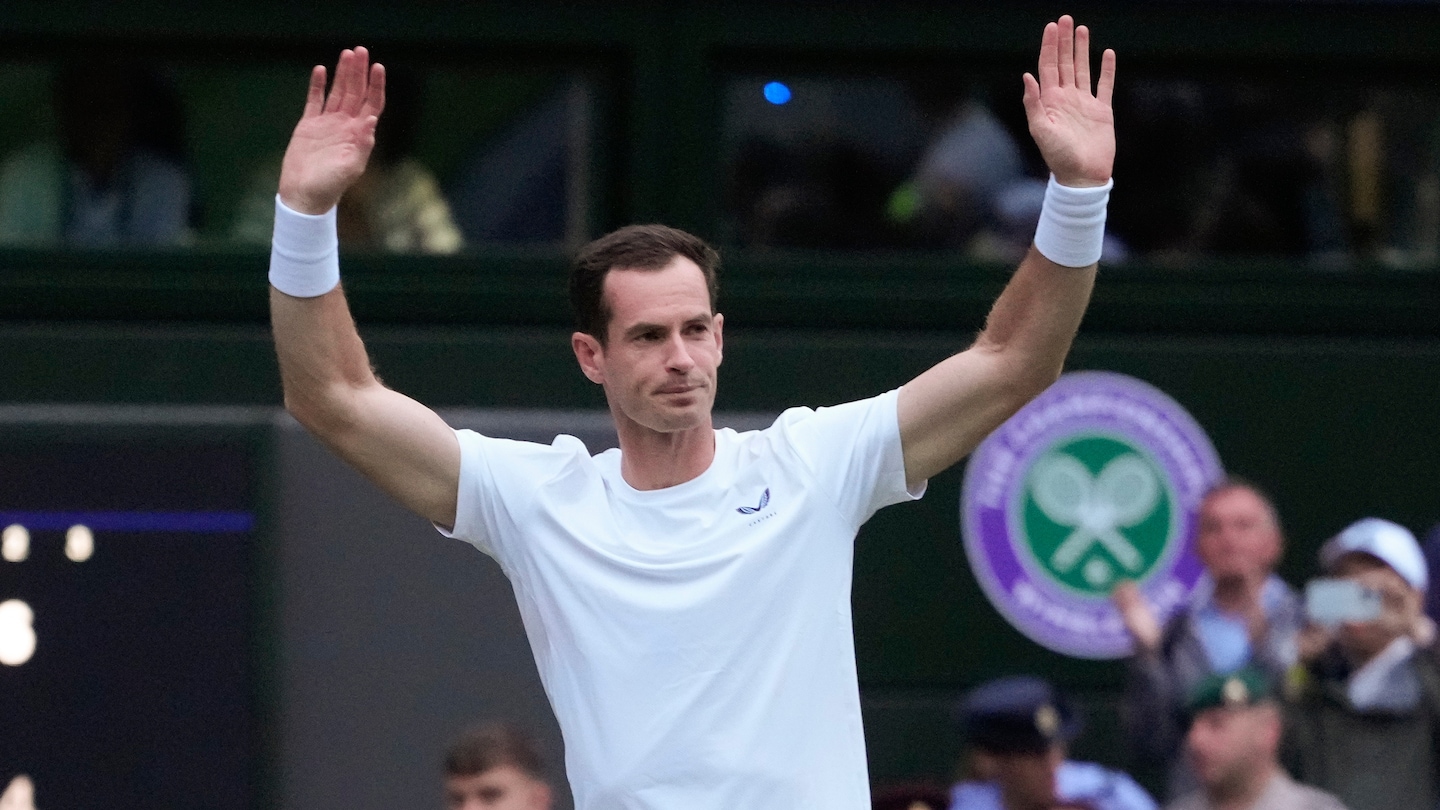Leaving all that behind, they gathered in Centre Court anyway, donning Wimbledon-coloured blankets and covering their bare necks with scarves as the sun began to set. They stood and reached for their phones just after 7pm as he walked onto the court, those with free hands leading the first waves of applause, everyone united in a desire to honour Andy Murray once more.
“Come on, Andy!” shouted one fan in familiar rhythm, before the referee had even flipped the coin.
There was shouting all night long, from young to old, to cheer on Murray and his older brother Jamie in their loss to Australians John Peers and Rinky Hijikata, but also for posterity.
Murray, a two-time Wimbledon champion who brought British tennis back to glory and forged a legacy as perhaps the most recognizable and serious member of the recent golden age of men’s tennis, has yet to play tennis at the All England Club. He will partner compatriot Emma Raducanu in the mixed doubles.
But Thursday was the official farewell to his home tournament after a 7-6 (8-6), 6-4 loss in which it became clear that the 37-year-old still has mobility issues following surgery on June 22 to remove a cyst from his back. The procedure was the latest in a marathon cycle of injuries and recovery that Murray has been mired in since 2018, when he underwent the first of two major hip operations. He returned from a second in 2019 to play, improbably, with a metal hip – he has won just one title since then, but each gruelling match reminded fans of the champion’s determination and unyielding passion.
Thursday’s match itself didn’t really feel relevant, except that it gave his mother, Judy, his father, Will, his wife, Kim, and their two eldest children the chance to see him play doubles with his older brother at a Grand Slam for the first time.
“Our words do not do justice to how good he is,” Peers said in a cursory speech before handing over the microphone and beginning an evening of tributes.
Sue Barker, a former player and legendary BBC television presenter, briefly came out of retirement to conduct the on-court interview as shouts of “Suuuuuue” descended amid a celebration of British tennis in full force. She began by asking Murray about his first Wimbledon final in 2012, which he lost to Roger Federer. The question gave the Scot a chance to remind the tennis world what it will miss about his character – equal parts dry, biting and deeply sincere.
“I’m not saying I’m the most outgoing or bubbly personality,” Murray said dryly of that loss. “But I think people saw how much I cared about sports — for the first time, maybe.”
Later that year, he won the US Open for his first of three Grand Slam trophies, and the following year he defeated Novak Djokovic in straight sets to become the first British man to win the Wimbledon singles title in 77 years. His second Wimbledon crown came in 2016.
Murray reminisced in front of an impressive lineup on Thursday. John McEnroe, Martina Navratilova, Conchita Martinez, Iga Swiatek, Djokovic and current British No. 1 Jack Draper were in attendance for the on-court ceremony, with Federer, Rafael Nadal and Djokovic taking turns addressing Murray in a video retrospective of his career. Venus Williams was also part of the video, as a friend and fellow champion for gender equality in tennis. Murray was the rare male player to speak out for women’s tennis throughout his career, often correcting reporters who overlooked the achievements of female players.
He said he hopes fans will remember him for the dedication he showed.
“I think I’ve done really well throughout my career, regardless of the highs and lows — whether it was winning tournaments, having tough losses, having surgery, having a setback — … I always came to work with the same dedication, work ethic and passion as I had the day before,” Murray said. “… I definitely didn’t do a great job all the time. On match days, I was far from perfect, but I always came to work and I always did my best. I gave it my all.”
After all the pomp and circumstance, Murray acknowledged how difficult even doubles play was. He had obvious difficulty moving, sometimes eliciting muffled gasps from the crowd when he stopped abruptly after a stroke, and he couldn’t serve anywhere near his top speed.
He reiterated that he was not retiring because his love for tennis had faded. His body dictated the end of his career, as has happened to so many of his peers. Murray said he is at peace with that. He plans to take a family vacation, play in the Paris Olympics and then retire.
“That’s something that, yeah, I think it’s a little bit out of my control. If I knew my body could handle it, I would do it — there’s nothing about the sport that I hate and … I don’t want to do it anymore for that reason. I love the travel. I love the competition, practicing, trying to get better, all that stuff,” Murray said. “I know it’s time now. I’m ready.”
After the tributes, Murray walked off Centre Court, stopping to hug every former player he saw, then walked through the stadium until he emerged onto a catwalk above the ground. Members of the crowd realised they were about to see their own champion once more, so they ran out to wave goodbye.
